The pros of sleeping on the couch
Before we go ballistic on why you shouldn't sleep on the couch, let's go over some of the pros of sleeping on one. After all, if it were that bad to sleep on the couch, we wouldn't do it, would we?
However, do note that these benefits mostly relate to falling asleep on the couch every now and then. If you sleep on the couch every single night, some of these pros are unlikely to apply.
Easier to fall asleep (sometimes)

There are some “good” reasons why it can be easy to fall asleep on a couch. For one, you're comfortable and relaxed because you're in your own living room, surrounded by the people you love, so you don't have any trouble falling asleep.
It's also easy to drift away because you're likely watching some boring show on TV that you can't be bothered to turn off. Plus, if you have to get up for any reason during the nap, it's much easier to do so when you're already on the couch instead of having to get up and walk through your whole house all the way from your bedroom. Ah, the convenience…
On top of that, depending on your sleeping position, you might just be more comfortable. For example, if you usually sleep comfortably on your side, the arm rest makes for a natural pillow. And, if it's for only one night, you might even avoid the neck and shoulder pain an improper pillow usually causes.
And for some sleeping positions, you might find that they're better than your own bed. For example, since sofas are usually firmer than mattresses, stomach sleepers can have a higher sleep quality than normal!
No cough

When you have a cold and are coughing a lot, it is a good idea to keep your head elevated so as not to lose quality sleep. This will help prevent mucus from accumulating down your throat and making you cough more. This condition is called postnatal drip and is often at its worst when you're lying down flat.
On top of that, depending on your sleeping position, sleeping on the couch might help with coughing in general. For example, if you're a smoker, you might find that sleeping on your side can cause coughing fits. However, if you fall asleep on the couch on your back, your throat will likely be a lot less irritated.
No gastroesophageal reflux disease (GERD)
Sleeping on the couch may also help with GERD symptoms. Research has shown that even a slight elevation can ease heartburn and acid reflux. Both of them are known to cause you to cough in search of relief.
And aside from just coughing, gastroesophageal reflux disease can cause serious discomfort and pain. This can in turn make it harder to fall asleep or can even wake you up in the middle of the night. So, lessening the symptoms of gastroesophageal reflux disease can be a big help!
That being said, this doesn't solve the underlying issue. And there are simple ways to temporarely treat gastroesophageal reflux disease. So, it's not exactly a miracle cure.
No Obstructive Sleep Apnea
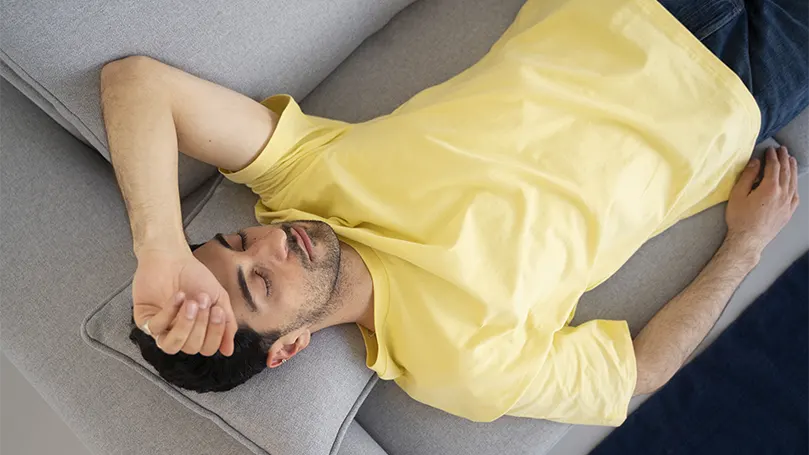
Sleep apnea is a common sleep disorder that causes you to heavily snore. You can also stop breathing for short periods of time during sleep. This can lead to fatigue, headaches, and a general feeling of tiredness throughout the day. Not to mention it heavily disrupts sleep quality.
One of the ways to combat the symptoms of sleep apnea is to elevate your head while you sleep. This is why couch sleeping tends to help. Propping your head up on the sides helps keep your airways open. That prevents you from snoring and stopping breathing in your sleep.
Again, like with GERD, this isn't a cure for Obstructive Sleep Apnea. But when it comes to short-term fixes or lifestyle adjustments, it's one of the easier things to implement. Plus, it can allow both you and your partner (if you happen to share the bed otherwise) to fall asleep more easily!
Orthostatic hypertension
Orthostatic hypotension is a condition in which individuals have low blood pressure when standing due to autonomic nervous system malfunction. But what they also may have is a high blood pressure while resting.
To help improve, or better yet regulate, blood pressure while sleeping, medical professionals often recommend sleeping with the head elevated. In other words, sleeping on the couch may help with this.
However, sleep experts aren't in complete agreement about whether or not this helps because various studies indicate that sleeping with an elevated head impacts orthostatic hypotension symptoms differently. So, this isn't a guaranteed boost to your sleep quality but it might help some people fall asleep – just ask your doctor first.
Better sleep environment (in some cases)
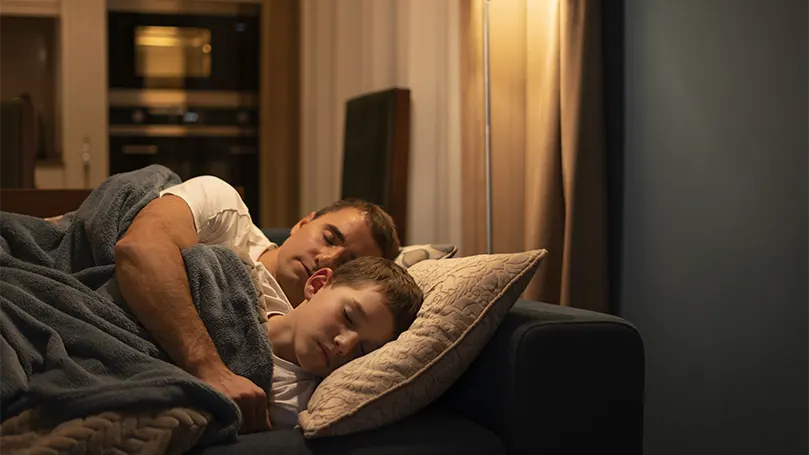
It's not common, but your couch could potentially be more comfortable than your bed – especially if your mattress is old and worn down. So, if you're struggling to get comfortable and fall asleep in your bed, then it may be tempting to just give up and sleep on the couch instead.
Also, there's a solid chance your living room may be quieter and darker than your bedroom, which could also lead to deeper, more restful sleep and an overall better sleeping environment.
Lastly, if your computer is in your bedroom, you might find it easier to relax when sleeping on the couch. This is because your brain might associate your bedroom with work or fast-paced games/movies. Couch sleeping on the other hand might not have any such associations, allowing you to sleep comfortably.
The cons of sleeping on the couch
Now that we've gotten the good stuff out of the way, let's talk about all the cons and reasons why you shouldn't add couch sleeping to your daily routine. After all, there's a reason we've never recommended couch sleeping as your primary resting activity.
Neck & back pain

First and foremost, sleeping on the couch usually involves sleeping on a pillow that's not actually made for sleeping. As you can imagine, resting your weary head on a pillow like that could lead to some serious neck trouble.
Not to mention, if you're someone who prefers to sleep on their side or stomach, then the couch is definitely not going to be comfortable for you. The unevenly firm surface and lack of support will likely lead to some back and neck pain, as well.
While it's true that couches can be more comfortable than beds in some cases, they're usually not as comfortable as an actual bed would be in the long run. This means that you're likely going to “enjoy” poor sleep quality when you crash on the couch and you'll most likely wake up aching and sore.
And once you develop back, neck and shoulder pain, you're likely to get even worse sleep the following night. So, it only gets worse over time and doesn't promote sound sleep or a good sleep posture!
No bed sharing
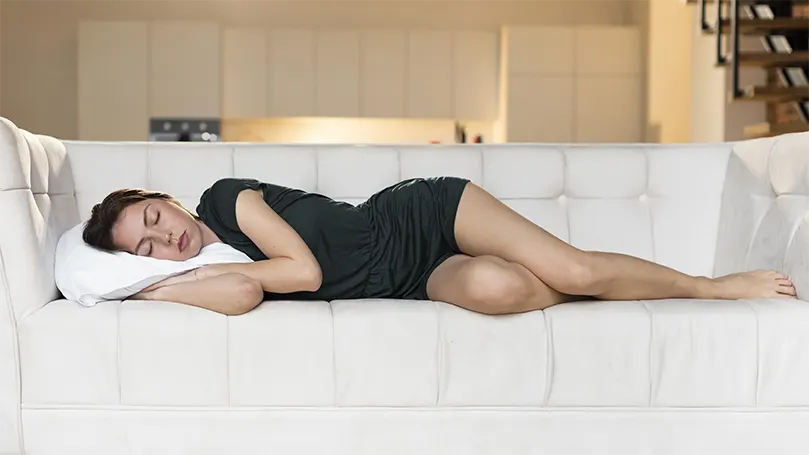
While this could also be a good thing if you're sharing the sheets with a restless sleeper, research shows that sleeping next to a loved one actually calms us down and helps us fall and stay asleep.
So, if you're used to snuggling up with your partner at night, while you won't miss elbows to the forehead during the night, you'll definitely miss spooning and cuddling while sleeping alone on the couch.
And while we don't usually classify love under sleep hygiene, it does come close! After all, stress and depression can ruin sleep quality and the power of snuggling cannot be underestimated.
Impaired support and comfort

Even if you get your hands on the best couch in the world, chances are, it's not as supportive as comfortable for all night sleeping as the best memory foam mattress on the market. It's that simple.
Most of the time, you're sleeping on several cushions, which means that your hips and shoulders are likely going to sink down into the couch, which isn't good for your spine or sleep posture. This could potentially cause some serious pain in your lower back, neck, and shoulders.
On top of all of that, most couches aren't designed for sleeping, which means they're just not going to be as comfortable as an actual bed would be. So, if you're used to sleeping on a cloud-like mattress, then you're definitely not going to get that same level of comfort when you hit the hay on the couch.
There are also less obvious ways a good mattress increases sleep quality. For example, by keeping you cool or minimising motion transfer. And sleeping on the couch is highly unlikely to come with these benefits.
Limited sleeping position
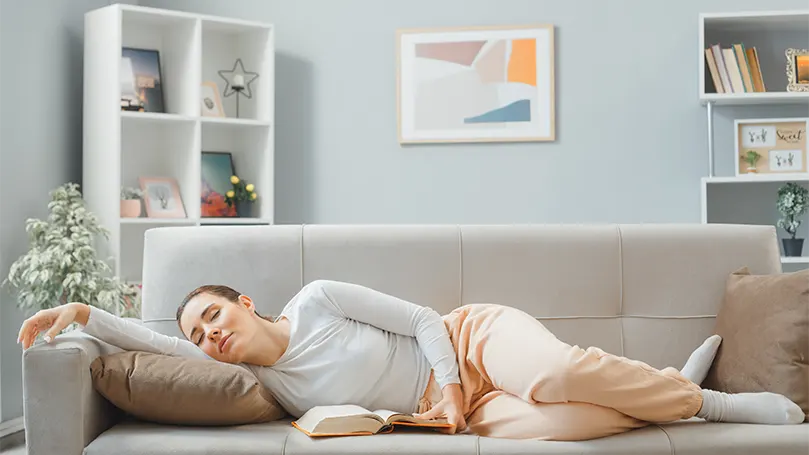
When you think about it, there's only one suitable way for you to sleep on your couch – on your back.
Sure, you could rest on your side, but the chances are, the couch sides are too high for you to comfortably rest your head on, so if you don't want to wake up stiff and in excruciating pain – you won't sleep on your side.
And, don't even get us started on the stomach sleeping. Unless your couch is very long so you can stuff your head down into the cushion, there simply isn't a way for you to rest on your stomach.
Of course, a large enough couch or a good sofa bed can avoid this issue and comform to any sleeping position. However, you still have to wonder whether your sleep posture is going to be as good as it would be when sleeping on a traditional bed.
Less space
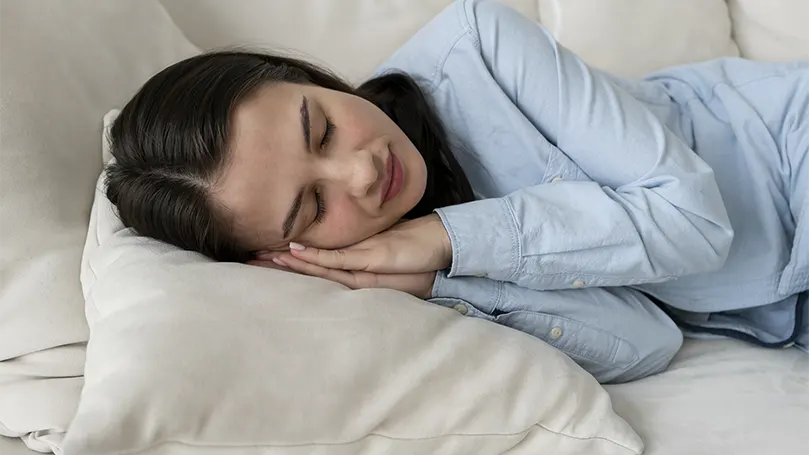
Most couches are as wide as a cot bed mattress, so it's safe to say they're not the spaciest things to sleep on. And, while we may not realise it, sleeping on such a narrow surface could actually cause some serious issues.
For one, you're likely going to wake up feeling more cramped and uncomfortable than when you went to sleep. Not to mention, if you toss and turn a lot during the night – which most of us do – you could easily find yourself hanging off the edge of the couch in the morning or rudely waken up by the sound of your face hitting the floor. Come to think about it, you'd probably get waken up by the pain of your face kissing the floor, but does it really matter?
And if you have a fear of enclosed spaces, falling asleep becomes even more difficult. Plus, keep in mind that most pets won't have an understanding of your new bed. So, your dogs will probably still try to squeeze onto the couch with you!
Not for infants

With or without parents, infants should not sleep on a couch or a sofa. It's incredibly easy for a baby to get stuck between couch cushions or turn in such a way that their airways get blocked.
As a matter of fact, an analysis of over a thousand SIDS cases found that almost 150 of them involved sleeping on a couch. Another horrifying statistic is that infants sleeping on a sofa or a couch are 50 to 70 times more likely to succumb to sudden infant death syndrome than those sleeping in a proper environment.
How to sleep on the couch (if you have to)?
Even though it is fairly obvious that it's much better for you to sleep in your bed than on your couch, we still wanted to share some tips with you.
Since neither of us are going to stop napping on a couch every now and then, we thought we'd share a few expert tips with you – whether you're just looking to nap for an hour or sleep for a whole night.
No TV
We get it, sleeping on a couch and not watching TV doesn't really go hand in hand. However, limiting blue light is the best way to ensure you get a good night's sleep.
Now, if you're just planning on catching some ZZZs for an hour in the afternoon, sure, watch some TV. But, if you're substituting your bed for a couch on an everyday basis – turn the TV off. All that blue light will only make it harder for you to fall asleep.
That's because blue light tells our body that it's daytime and therefore the time to be energetic. This applies to most modern electronics as they all emmit blue light.
However, if nothing else, some apps and devices do offer blue light modes or filters. And you can also get blue light blocking glasses. But it's generally better to just avoid screens at night.
Get comfortable
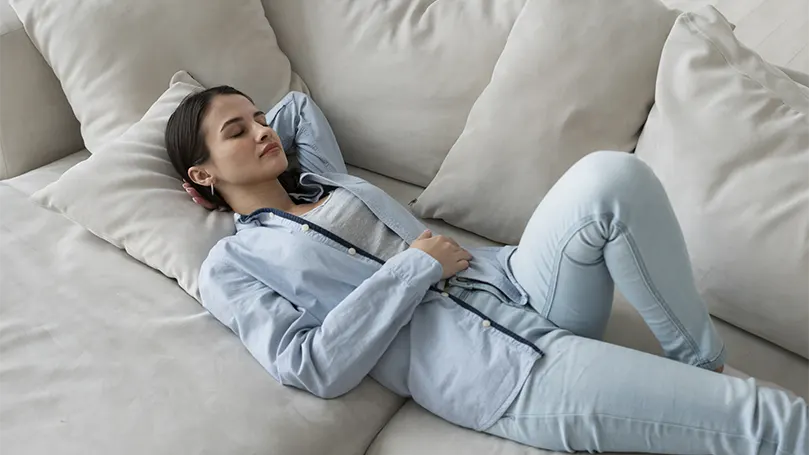
The first thing you need to do is find a comfortable position. Yes, we know we said there's only one good way to sleep on a couch, but that doesn't mean there aren't any “other” ways. Just try to avoid sleeping on your stomach or your side.
Now, once you've found the perfect position, grab a pillow and create a little cocoon for yourself. This will help support your back and neck and make sure you're as comfortable as possible. And if you have acid reflux or obstructive sleep apnea, make sure that your head is elevated.
Darken the room
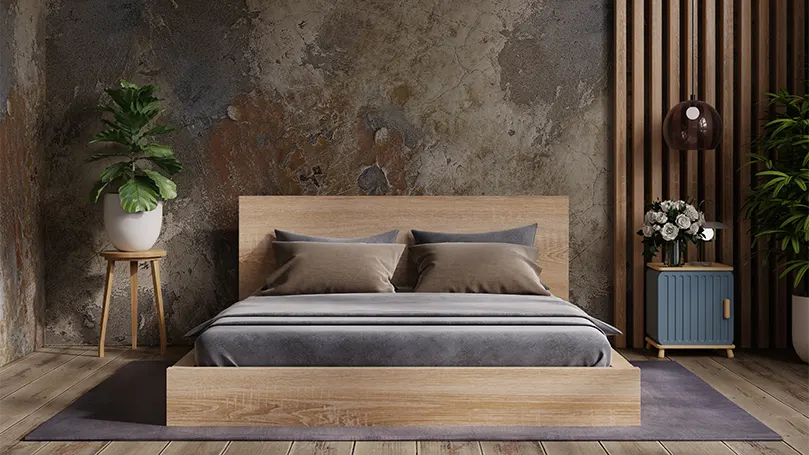
This goes without saying, but you should really turn off the lights before you go to sleep. Not only will it help you fall asleep faster, but it will also make sure you get sound sleep through the night. Waking up in a dark room will also be easier on the eyes, so that's another thing to keep in mind.
Of course, if you're sleeping during the day, chances are you won't be able to completely darken your room. In that case, try wearing a sleep mask or pulling those heavy blackout curtains over your windows to make sure there isn't too much light bothering you. You'll get a better night's sleep that way.
If you want to be extra certain you can even do both – with the sleep mask blocking out any light that gets past the black-out curtains. Having it be this dark is sure to better your sleep quality to some extent.
Pillows & bedding
If your couch has indeed become your bed – you'll have to treat it as such. That means investing in great pillows and quality bedding. It will make a world of difference, we promise.
So, get a pillow that suits your sleep position. If you have neck, back or shoulder pain, see what's causing it. Sometimes a new pillow can be the solution, other times a mattress topper might do the trick, and sometimes you just need to see your GP.
Get a sleeper sofa (if possible)
If sleeping on the couch is a must, at least let it be a sleeper sofa. That way, you can at least stretch out a bit and not feel like you're sleeping in a cradle.
Just remember, even though a sleeper sofa may be more comfortable than a regular couch, it's still not as good as your own bed. So, only use it as a last resort or when your friends and family come over for the night. And try to make sure that you're getting enough sleep every night.
After all, getting enough sleep is essential for your health and you never want to put your health at risk!
Is it OK to sleep on the couch sometimes?
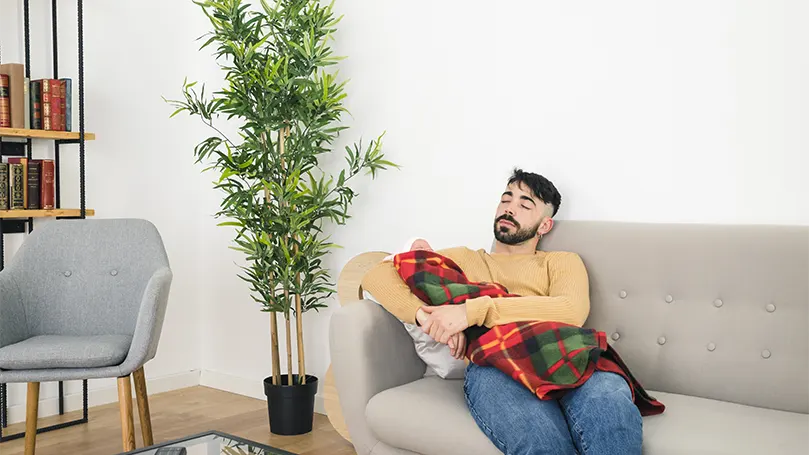
While there are some benefits to sleeping on a couch every now and again, it's definitely not something you should make a part of your sleep hygiene and bedtime routine. However, if you're just looking to nap for an hour or two or spend a few nights each month on a couch – that's probably fine.
While the lack of support and comfort will likely lead to some neck and back pain, and you'll also miss out on the benefits of bed-sharing – if you know what we mean – we still can't say occasionally sleeping on the couch is the worst idea ever.
Overall, sleeping on the couch is definitely not something we'd recommend – no matter how comfortable it may seem. However, we're not here to judge, so if you absolutely must sleep on a couch – at least do it the right way. And, if you find yourself doing it more often than you'd like, maybe invest in a new bed?
After all, we spend a third of our lives sleeping, so we might as well do it in the best possible way, right? And for most people and in most cases, sleeping on the couch simply isn't the best way to sleep!
Spread the word
Recommended reading:

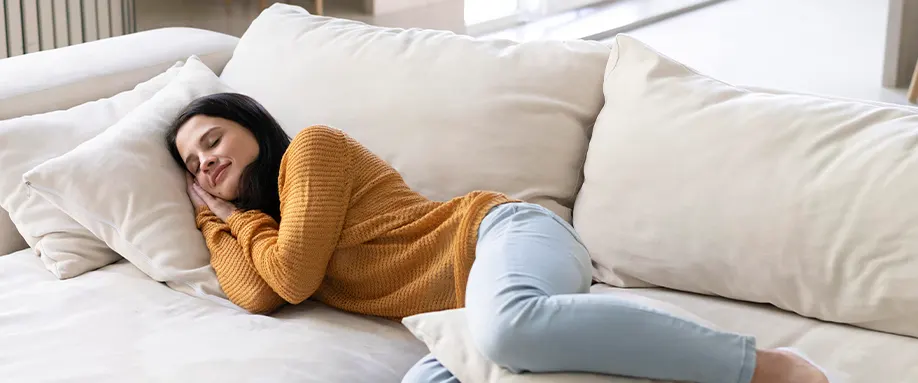











There are no comments yet
"*" indicates required fields